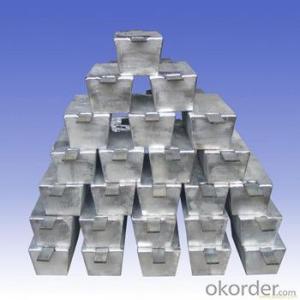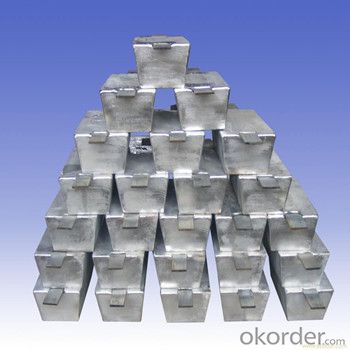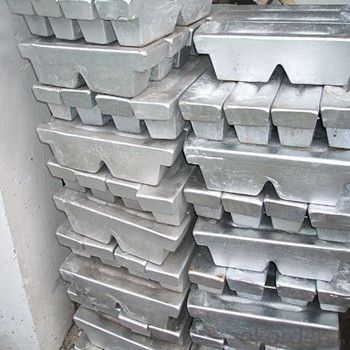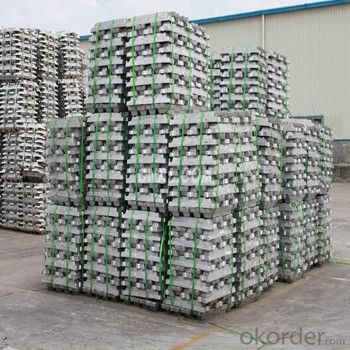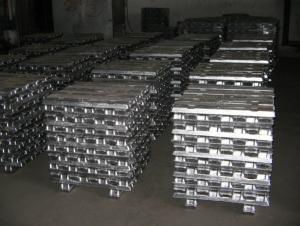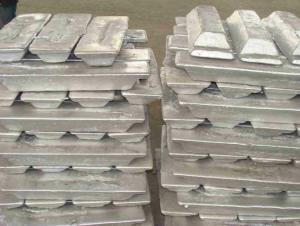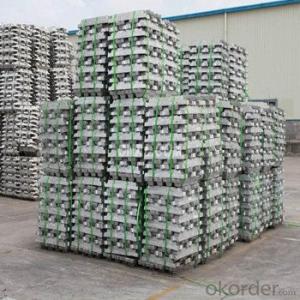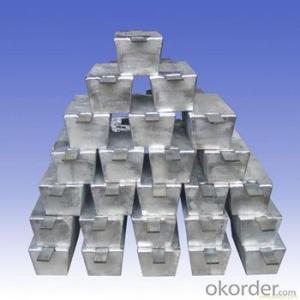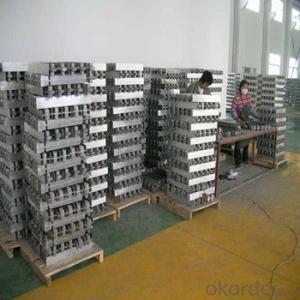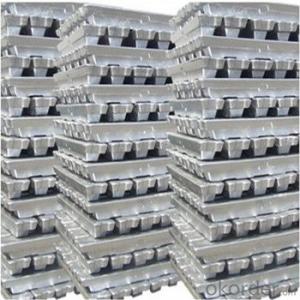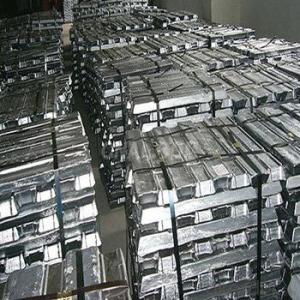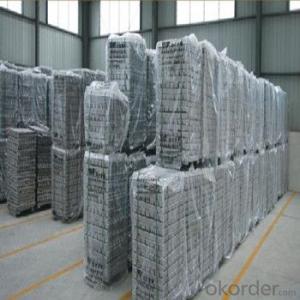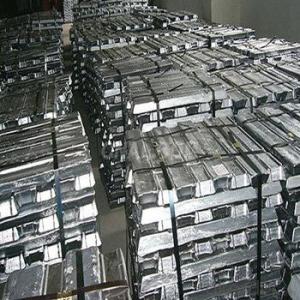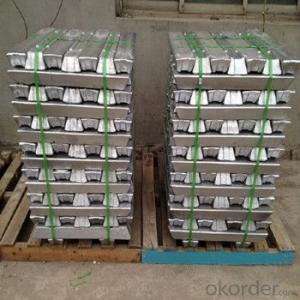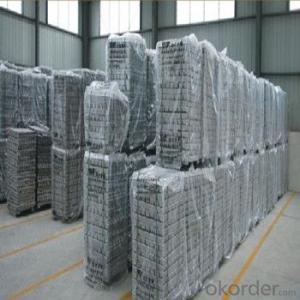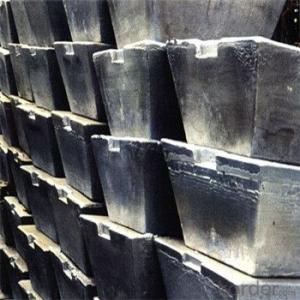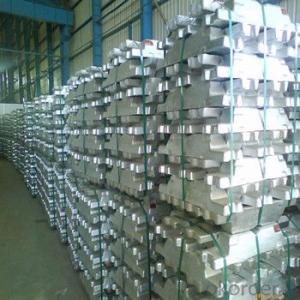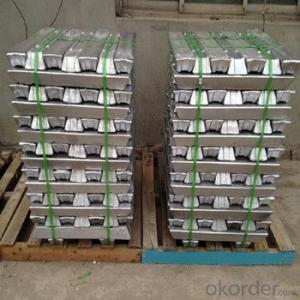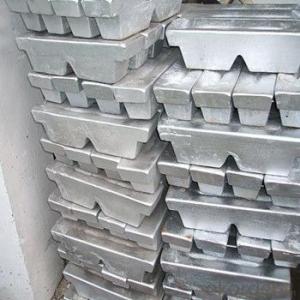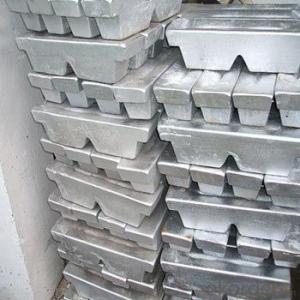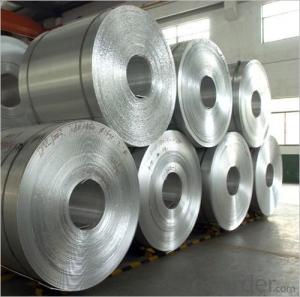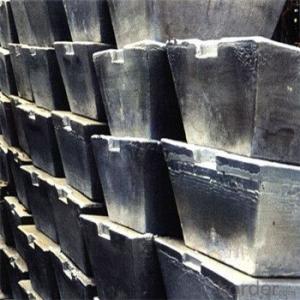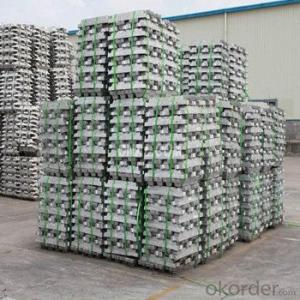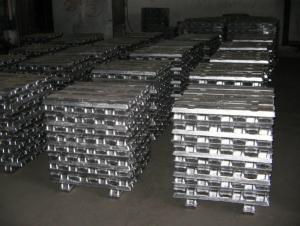Aluminium Ingot Pure Good Quality With The Lowest Price
- Loading Port:
- China main port
- Payment Terms:
- TT OR LC
- Min Order Qty:
- 10000 m.t.
- Supply Capability:
- 100000 m.t./month
OKorder Service Pledge
OKorder Financial Service
You Might Also Like
Pure Aluminum Ingot Used for Industry
1.Structure of Aluminum Ingot Description
A material that has been cast into a shape in order to be transported and processed easier than in an unprocessed form. An ingot is typically rectangular in shape, which allows it to be stacked. Ingots are most commonly associated with metals, with ingots of gold held in the vaults of banks and brokerages being popular images.
2.Main Features of the Aluminum Ingot
•High Purity
•High strength
•Fast melting
•Best price
•Good after-service
3. Aluminum Ingot Images
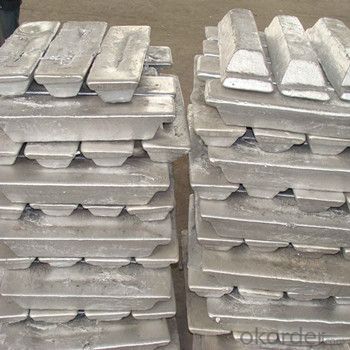
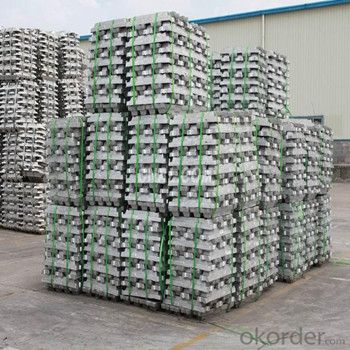
4. Aluminum Ingot Specification
| 500*500*6mm | 500*500*8mm | 1000*500*20mm | 1000*500*15mm |
| 1000*500*8mm | 1000*500*10mm | 1000*500*30mm | 1000*500*6mm |
| 1800*800*20mm | 1800*800*10mm | 2000*1000*20mm | 2000*1000*10mm |
5.FAQ of Aluminum Ingot
We have organized several common questions for our clients,may help you sincerely:
①How about your company?
A world class manufacturer & supplier of castings forging in carbon steel and alloy steel,is one of the large-scale professional investment casting production bases in China,consisting of both casting foundry forging and machining factory. Annually more than 8000 tons Precision casting and forging parts are exported to markets in Europe,America and Japan. OEM casting and forging service available according to customer’s requirements.
②How to guarantee the quality of the products?
We have established the international advanced quality management system,every link from raw material to final product we have strict quality test;We resolutely put an end to unqualified products flowing into the market. At the same time, we will provide necessary follow-up service assurance.
③How long can we receive the product after purchase?
In the purchase of product within three working days, We will arrange the factory delivery as soon as possible. The pecific time of receiving is related to the state and position of customers.Commonly 7 to 10 working days can be served.
- Q: How are aluminum ingots used in the production of furniture?
- Aluminum ingots are utilized in the production of furniture in various ways. Firstly, aluminum ingots serve as a primary raw material for the creation of lightweight and durable furniture frames. The ingots are melted down and cast into desired shapes and sizes, forming the skeleton or structure of the furniture piece. Once the aluminum frame is formed, it undergoes further processing, such as cutting, bending, and welding, to achieve the desired design and functionality. This allows for the creation of intricate and modern furniture designs that are both aesthetically pleasing and functional. Additionally, aluminum ingots are commonly used in the production of outdoor furniture due to their excellent corrosion resistance properties. Outdoor furniture is exposed to harsh weather conditions, and aluminum's natural resistance to rust and deterioration makes it an ideal choice for such applications. Moreover, aluminum ingots can be used to create various components of furniture, such as legs, armrests, and decorative elements. These components are then assembled with other materials, such as wood, glass, or fabric, to create the final furniture product. The use of aluminum ingots in furniture production offers numerous advantages. Aluminum is lightweight, making the furniture easy to move and rearrange. It also provides exceptional strength and durability, ensuring the longevity of the furniture piece. Furthermore, aluminum is a highly recyclable material, making it an eco-friendly choice for furniture manufacturing. In conclusion, aluminum ingots play a crucial role in the production of furniture. They are transformed into frames, components, and decorative elements, providing lightweight, durable, and stylish furniture options. The versatility and sustainability of aluminum make it a preferred choice for furniture manufacturers, especially for outdoor and modern designs.
- Q: Where can I get aluminium ingots in cans?
- Because the cans of printing, transportation, recycling process, there will be a lot of impurities, so to purify.
- Q: How are impurities removed from aluminum ingots?
- Impurities are removed from aluminum ingots through a process called refining or purification. There are several methods used to achieve this, including: 1. Fluxing: Fluxes, such as chlorine or sodium chloride, are added to the molten aluminum to react with the impurities. This process forms compounds that are more easily removed as slag or dross. 2. Electrolytic refining: In this method, the impure aluminum ingots are immersed in an electrolyte solution and subjected to an electric current. The impurities are attracted to the anode, where they accumulate as a residue, while the purified aluminum collects at the cathode. 3. Centrifugal separation: This technique involves spinning the molten aluminum in a centrifuge, which causes the denser impurities to migrate towards the outer edge. The purified aluminum is then collected from the center. 4. Filtration: Filtration can be used to remove solid impurities from the molten aluminum. Filters made of materials like ceramic or graphite are employed, which trap the impurities while allowing the purified aluminum to pass through. 5. Vacuum treatment: In this method, the molten aluminum is subjected to a vacuum environment, which helps to remove volatile impurities like hydrogen and some low-boiling-point metals. The reduced pressure facilitates the removal of these impurities by vaporization. It is important to note that the specific method chosen for impurity removal depends on factors such as the type and concentration of impurities, the desired level of purity, and the cost-effectiveness of the chosen process. Different industries and applications may require different levels of purity, and thus, the refining process may vary accordingly.
- Q: Can the art knife cut the aluminum ingot?
- It is recommended to use carbide alloy milling cutters, and corn cutters are not recommended. Special aluminum processing of milling cutter front angle and screw angle are particularly sharp, and the drain trough is through special polishing processing, to chip removal has great influence, not easy to stick knife! It is also suggested that the use of emulsion cooling can greatly reduce the heat of cutting! If you are looking for surface finish, it is recommended to use cooling oil cooling!
- Q: Can aluminum ingots be used in medical applications?
- Yes, aluminum ingots can be used in medical applications. Aluminum is a versatile metal that offers numerous advantages for medical devices and applications. Its lightweight nature, corrosion resistance, and excellent thermal conductivity make it an ideal choice for various medical equipment and instruments. Aluminum ingots can be used in the manufacturing of medical devices such as prosthetics, orthopedic implants, and surgical instruments. These ingots can be processed into precise shapes and sizes to meet the specific requirements of medical applications. Aluminum is also commonly used in the fabrication of medical equipment like MRI machines, X-ray machines, and dental tools. Additionally, aluminum ingots can be used in the production of medical packaging materials. Aluminum foils are often employed for packaging pharmaceutical products, as they provide a barrier against moisture, light, and oxygen, ensuring the integrity and longevity of the medications. It is important to note that the use of aluminum in medical applications should comply with strict regulations and guidelines to ensure patient safety. Manufacturers must adhere to stringent quality control measures and conduct thorough testing to guarantee the biocompatibility and safety of the final product. In conclusion, aluminum ingots can indeed be used in various medical applications due to their favorable properties. However, it is crucial to ensure compliance with applicable regulations and standards to guarantee the safety and effectiveness of the final medical product.
- Q: What is the aluminum ingot smelting
- The scrap recycling processing method: heavy media beneficiation method: using gravity separation method of heavy medium density greater than aluminum copper and other heavy metals, the use of aluminum density than other non-ferrous metal scrap to small principle, floating in the medium, and heavy non-ferrous metal sink to the bottom, to the purpose of separation. But the key to technology is to screen a medium of density greater than aluminum and less than copper, which is not water or any other liquid, but definitely a fluid. The fluid in the reciprocating motion work, aluminum floating are separated in the medium above. Parabolic beneficiation: the use of different kinds of basically the same object, when the same force was thrown, the different placement of the principle, you can waste aluminum scrap density of different kinds of waste non-ferrous metal separation. With the same force along the line to shoot different density and volume of the same basic object, all kinds of objects moving in parabolic direction, landing in different positions. The most simple experiments can be carried out at the level of the conveyor belt, when the waste on the conveyor belt with high speed, when to the end, the scrap aluminum is thrown along a straight line, due to a variety of different gravity waste, were landing at different points, so as to achieve the purpose of sorting of scrap aluminum. This method can make the aluminum, copper, lead and other waste evenly. The equipment manufactured according to this principle has been adopted abroad, and it is still in the research stage in china.
- Q: Process description of aluminium ingot
- The casting process of aluminum ingot is molten aluminum liquid into the mold. When the billet is cooled and cast out, the injection process is the key step of the product. The casting process is the physical process of liquid aluminum being crystallized into solid aluminum. The technological process of casting aluminium ingots is as follows:Aluminum - slag - weighing batching furnace - refining - casting - Remelting aluminum ingot - finished product inspection, weighing and warehousingAluminum - slag - weighing batching furnace - scouring - casting alloy ingot casting alloy ingot - - - - - storage of finished product inspection work
- Q: How are aluminum ingots used in the automotive industry?
- Aluminum ingots play a crucial role in the automotive industry as they are widely used for manufacturing various components of vehicles. One of the primary applications of aluminum ingots is in the production of engine blocks. The lightweight nature of aluminum makes it an ideal material for engine blocks, as it helps to reduce the overall weight of the vehicle, thereby improving fuel efficiency and performance. Additionally, aluminum ingots are used in the manufacturing of wheels, transmission cases, cylinder heads, and other critical parts of the automobile. The high strength-to-weight ratio of aluminum makes it a preferred choice for these components, as it ensures durability and enhances the overall safety of the vehicle. Moreover, aluminum ingots are utilized in the construction of car body panels, such as hoods, doors, and trunk lids. Aluminum body panels offer significant weight reduction compared to traditional steel panels, leading to improved energy efficiency and handling. Furthermore, aluminum has excellent corrosion resistance properties, which helps to enhance the longevity of these body panels. In recent years, with the growing demand for electric vehicles (EVs), aluminum ingots have gained even more prominence in the automotive industry. EVs require lightweight materials to compensate for the heavy battery packs, and aluminum ingots provide the perfect solution. The use of aluminum in EVs not only helps to increase driving range but also improves battery life and enhances overall performance. In conclusion, aluminum ingots are extensively used in the automotive industry for their lightweight nature, strength, and corrosion resistance properties. They are vital components in engine blocks, transmission cases, wheels, body panels, and other critical parts, contributing to improved fuel efficiency, safety, and performance of vehicles.
- Q: What are the scouring agents in the die casting process, such as slag remover, coating agent, flux, and what matters should be paid attention to when the aluminium ingot is dissolved?,
- scouring agentFor refining alloy liquid, the main purpose is to remove the gas inside the liquid metal liquid, raise the density of the aluminum liquid die-casting
- Q: How can the sustainability practices in aluminum ingot production be enhanced?
- The sustainability practices in aluminum ingot production can be enhanced by implementing measures such as increasing energy efficiency, adopting renewable energy sources, reducing waste generation and implementing recycling programs, minimizing water usage, optimizing transportation and logistics processes, and promoting responsible sourcing of raw materials. Additionally, investing in research and development to develop innovative and eco-friendly technologies can further enhance sustainability practices in aluminum ingot production.
Send your message to us
Aluminium Ingot Pure Good Quality With The Lowest Price
- Loading Port:
- China main port
- Payment Terms:
- TT OR LC
- Min Order Qty:
- 10000 m.t.
- Supply Capability:
- 100000 m.t./month
OKorder Service Pledge
OKorder Financial Service
Similar products
Hot products
Hot Searches
